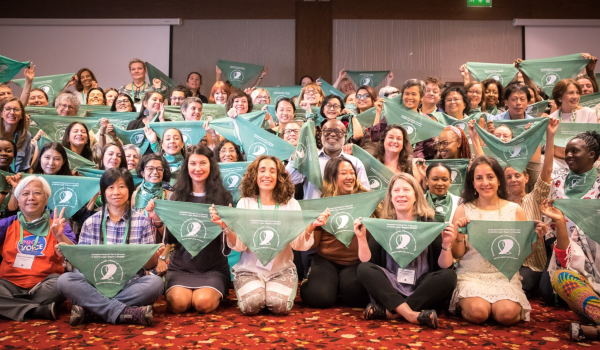
Read the full report here
Introduction
On 5-7 September 2018, the International Campaign for Women’s Right to Safe Abortion hosted an International Forum in Lisbon, Portugal. The aim of the forum was to bring together thought leaders from around the world to examine synergies and discuss how to move global, regional and national work for the right to safe abortion forward.
Some 100 participants from 54 countries attended the Forum. They were abortion rights advocates, health policymakers and professionals, human rights and legal experts, youth activists, researchers, members of civil society organisations and academics. The combination of participants from the grassroots to the UN level secured a dynamic exchange of knowledge and experience.
See Annex 1 for the list of participants.
In developing a global advocacy agenda, three thematic areas stood out as key drivers of change – medical abortion pills as new technology, law reform to ensure protection of rights and to promote public health, and lessons learned from campaigning and working as a movement.
Day 1: Medical abortion pills: reconceptualising access to abortion
Day 2: Working towards decriminalisation
Day 3: Advocacy and the different faces of success: national case studies
The format was designed to maximise contributions from as many participants as possible. Each morning there were plenary sessions with presentations and participation from the floor, which allowed everyone to engage actively with questions and comments. These were followed by panels on regional experiences and challenges. The afternoons consisted of moderated parallel discussion workshops. The workshops set out key recommendations for future work.
See Annex 2 for the complete agenda.
Opening the Forum
Duarte Vilar (Former Director, Associação para o Planeamento da Familia, Portugal) welcomed the participants. He marked the 20-year anniversary of abortion law reform in Portugal in 1988, which has allowed for universally available national health services on abortion.
Ivana Radačić (Chair, UN Working Group on the issue of discrimination against women in law and in practice) opened the Forum. She highlighted that 40-years after adopting CEDAW, there is still a long way to go for the abortion rights movement. Criminalising abortion is one of the most extreme examples of seeking to control women’s bodies; however, it does not change much, as women still have clandestine abortions. The current backlash against abortion rights is due to rising authoritarianism and politicisation of religion in many countries and has led to new attempts to impose restrictive laws and increase barriers to access. Those arguing for protection of the rights of the “unborn” have been more and more vocal and with them, attacks on women’s sexual and reproductive rights increases and closes civil society space. Despite challenges, feminist activism is growing, however, and it is an important time to be part of the abortion rights movement.
Marge Berer (International Campaign for Women’s Right to Safe Abortion, UK) gave an overview of the issues under the three main themes and outlined the format and hoped-for outcomes of the three days.
DAY 1: Medical abortion: re-conceptualising access to abortion
Medical abortion has changed the discourse, approach and traditional perceptions of provider–patient relationships in abortion services. The first day of the Forum highlighted the controversies in introducing new technologies such as medical abortion pills into rigid health systems and seeking to shift the power structures that influence regulation of as well as access to abortion.
Presentations
Beverly Winikoff (Gynuity Health Projects, USA) opened the first plenary session by setting out the essential arguments for how and why medical abortion pills have truly become agents for change in access routes to abortion, made rules based on trimesters redundant and challenged the language and terminology of who can safely provide the pills. It is difficult to know when an abortion actually occurs with abortion pills and consequently to know how to apply the law because of the similarity to a miscarriage. Is it an abortion or a miscarriage? Women need the correct pills and the right dosage and regimen, plus information on where to go and whom to contact in case of problems or concerns. She reminded us that abortion is the only cause of maternal mortality that we can end immediately if we want to.
Kinga Jelinska (Women Help Women, Netherlands) continued the session by stressing the need to centre self-management of abortion pills in any discussion of advocacy and discourses on abortion. Providers, supporters and accompaniers of medical abortion are often feminist and human right activists and those using the pills are running ahead of the experts as part of an autonomous health movement that seeks to update the formal health system. Self-use is about quality of care, health and power while changing the culture around abortion. As part of that effort, she highlighted the importance to de-medicalise, de-stigmatise and de-criminalise and to see self-management as a harm reduction strategy.
Susan Yanow (Women Help Women, USA) began by saying that when women are self-managing their abortions with pills, we need to ask who the provider is. The new paradigm is to redefine the provider and understand the shift in power that this implies. There is a need to move beyond decriminalisation and empower communities. Moreover, she highlighted that it will be central to build a new vision of self-managed abortion taking place inside health regulatory systems rather than outside them. Abortion pills also challenge ways of populating data on abortion as well as securing quality assurance of the pills.
Jennifer Blum (Gynuity Health Projects, USA) presented the new IPPF medical abortion database, the first of its kind, which lists the type and brands of abortion pills available in some 60 countries, which was developed to meet an important international knowledge gap.
Regional Panel
This panel was about safe abortion information hotlines and other groups who provide medical abortion pills in legally restricted settings. Inna Hudaya (Samsara, Indonesia), Jedidah Maina (Trust for Indigenous Culture and Health, Kenya) and Ruth Zurbriggen (Las Socorristas, Argentina) shared their experiences of assisting women self-manage their abortions with pills outside of clinical settings.
Parallel discussion workshops: Abortion information and services
- New forms of provision of information on medical abortion use – national examples and perspectives
- Developing a national abortion service and training providers
- National registration/approval of one or both MA drugs and national guidelines to ensure their use
- Abortion for fetal anomaly in legal and illegal settings
- Role of health professionals as advocates for safe abortion
See Annex 3 for moderators, notes and recommendations from these workshops.
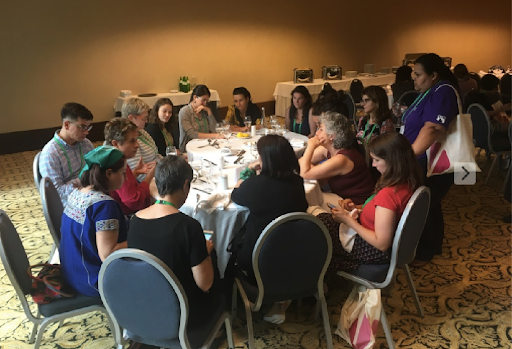
Day 2: Working towards decriminalisation
The decriminalisation of abortion is one of the most pressing issues in making abortion universally safe and accessible. The second day of the Forum explored and challenged understandings of abortion laws and strategic ways of attempting to reform or where possible, remove abortion from the criminal law.
Presentations
Marge Berer (International Campaign for Women’s Right to Safe Abortion, UK) began by summarising different interpretations of decriminalisation and argued that complete decriminalisation means not punishing anyone for providing safe abortion or having an abortion or providing information on safe abortion. She highlighted the importance of the recommendation by the French High Council on Equality between Women and Men in 2018 to create a constitutional amendment to guarantee equality between women and men, including the right to access contraception and abortion, in order to remove discrimination against women on the grounds of their sex.
Joanna Erdman (Dalhousie University, Canada) challenged perceptions of and links between time limits, human rights and the morality of abortion. One role of human rights law is to protect against irrational and arbitrary laws, e.g. when there is no connection between a law and what it seeks to achieve. Prenatal life has no obvious moral significance, and this is rarely assigned in law. Even if there was a rational time limit for “viability”, the gestational age at which viability may be reached varies widely. Thus, the reality and meaning of a time limit is unclear, and imprecise in its measurement. The only thing that time limits create is abuse of power.
Godfrey Kangaude (Coalition for the Prevention of Unsafe Abortion, Malawi) opened the session on regional experiences of strategic litigation by reflecting on the progressive and restrictive roles of national courts in Africa. Despite 15 years of a progressive regional treaty on rights (Maputo Protocol), most African countries still have restrictive abortion laws and high numbers of unsafe abortions. He also recommended constitutionalising the right to abortion and holding-governments accountable for service provision, implementation and enforcement of the law, and using litigation as a strategy to challenge injustice. He particularly stressed need to build coalitions and capacity for jurisprudence on abortion, while initiating and supporting limitations on the role of domestic and regional courts.
Ana Cristina González Vélez (La Mesa por la Vida y la Salud de las Mujeres, Colombia) presented the medium and long-term strategy pursued for law reform in Colombia. The Constitutional Court developed standards that guarantee access to abortion and there are crucial lessons to be learned from the work in Colombia to remove abortion from the penal code. They critiqued the existence of specific grounds and time limits for abortion, because these create a double standard in which abortion is sometimes considered a right, and sometimes a crime. She emphasised, however, that after 12 years, access to abortion in Colombia is still limited and unequal, which calls for a change of approach. Moreover, social mobilisation and cultural change must not be forgotten. Only total decriminalisation will restore women’s bio-legitimacy by valuing women’s lives in the biographical as well as biological sense.
Clara Rita Padilla (EnGender Rights, Philippines) focused on the arguments used in the Philippines to convince parliamentarians to take abortion out of the penal code. Penal provisions have never reduced abortions; they are a product of patriarchy, fundamentalist cultures/beliefs and colonial laws. Key public health arguments used include abortion as the leading cause of maternal death, hospitalisation and maternal morbidity. The abortion rights movement also focuses on fighting all facets of religious fundamentalism.
Ximena Casas (Planned Parenthood Federation of America, USA) and Susana Chavez (CLACAI, Peru) presented on the evolving legal strategies for abortion law reform in Latin America and the role of their joint biennial legal conferences for lawyers, prosecutors and judges and an important space for debate and exchange within the region’s juridical community. She showed two short videos and highlighted the successful regional campaign Niñas No Madres (Girls Not Mothers) which was recognised by the Special Rapporteur on Violence against Women.
Evelyne Opondo (Center for Reproductive Rights, Kenya) reflected on the Kenyan experience regarding the withdrawal of Kenya’s comprehensive national guidelines of 2012 on safe abortion, which were based on the expanded grounds for legal abortion added to the 2010 Constitution. She described how the withdrawal had led CRR to initiate strategic litigation in 2015 in the Kenya High Court on behalf of FIDA, other Kenyan NGOs and women who had suffered from unsafe abortions; the case has been heard periodically but is still pending.
Parallel discussion workshops: restrictive abortion laws in national contexts
- Working with government officials, parliamentarians, politicians, civil servants, and UN bodies to advance abortion rights
- The most difficult national situations
- Developing national advocacy campaigns for abortion law reform on human rights grounds
- Criminalising women and providers: trials and imprisonment for abortion
- Unwanted pregnancy following child sexual abuse: the role of the courts, medical professionals, parents and the girl herself
See Annex 4 for notes and recommendations from these workshops.
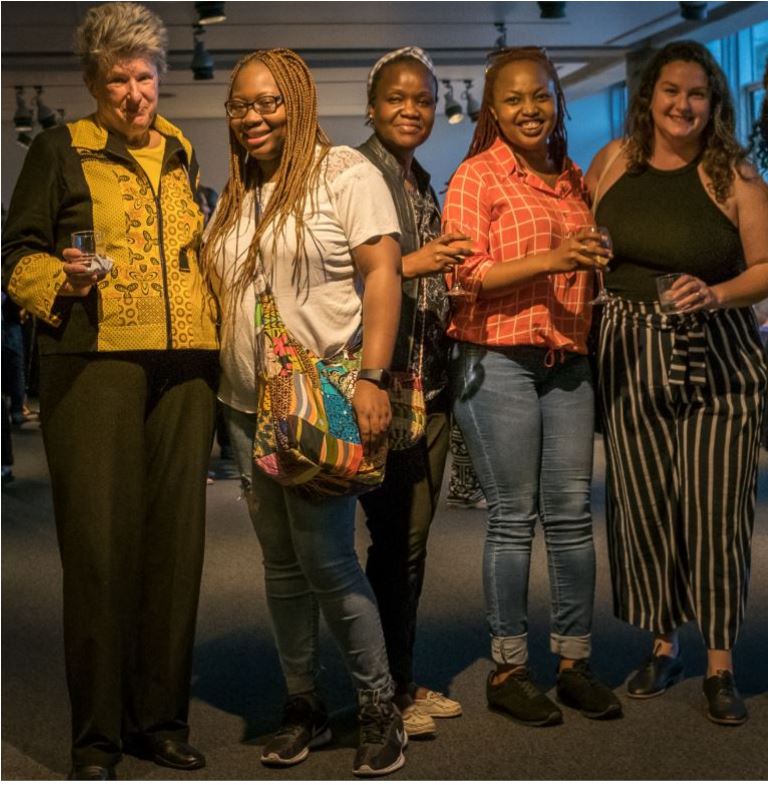
Day 3: Advocacy and the different faces of success: national case studies
There is great potential for countries to learn from each other when it comes to developing advocacy strategies on abortion. The third day provided an overview of advocacy on abortion rights by including national examples of campaigning for substantial abortion law reform and reflecting on how similarities between countries can be identified and addressed.
Silvina Ramos and Mariana Romero (Centro de Estudios de Estado y Sociedad, Argentina) presented key features of the legislative debate on the bill written by the women’s movement, in which 900 experts and social movement activists spoke in Congress over a period of three months and both the Minister of Health and former ministers advocated for legal reform. With support from journalists and opinion leaders, facts and evidence played a major role in both the social and legislative debates. There was substantial support from the wider women’s movement and international allies too, and abortion emerged as a crosscutting issue, overcoming political affiliations, and became a cause with political gain.
Gloria Maira (Mesa de Acción por el Aborto, Chile) on behalf of herself and Lidia Casas Becerra, Universidad Diego Portales, Chile) presented the process of how Chile, after a long and uncertain legislative process, finally legalised abortion on three grounds in August 2017. The law reform process led to successful change in the culture surrounding abortion, and led to a public debate with growing support for law reform. This was a case of social decriminalisation of abortion, as in Argentina, and a growing mobilisation for abortion on request, even though the law as passed was limited. Moreover, when the constitutionality of the new law was immediately challenged, the Constitutional Court recognised that although fetal life deserves protection, a fetus is not a person; thus, protecting fetal life does not require a ban on abortion.
Mary Favier (Doctors for Choice, Ireland) and Grainne Griffin (Abortion Rights Campaign, Ireland) mapped out the extraordinary campaign in Ireland, starting with a citizen’s assembly, that led to the national referendum in May 2018. The call for law reform in Ireland was not based on health grounds, but on women having to travel abroad and inequality of access. Judgments in the European Court of Human Rights also played a crucial role. Alliances were critical to success, especially with doctors, to legitimise abortion. The tragic cases of Savita Halappanavar and Ms Y had a huge emotional effect. Activities centred on stigma and personal difficulties experienced by women, through the telling and sharing of stories. Young women and grassroots campaigning were centrally involved throughout.
Regional Panels
Regional panels then set out the legal landscape on abortion in different regions, to demonstrate how law change and advocacy have unfolded and how regional similarities can be observed. The first panel, with Saba Kidanamariam (Ipas, Ethiopia), Dalmazia Cossa (Ministry of Health, Mozambique) and Vania Kibui (Ipas Africa Alliance), was on the legal abortion regimes in Africa, with examples from Ethiopia and Mozambique and the role of the African Commission for Human and Peoples’ Rights.
The second panel was on the Middle East and North Africa, where work for abortion rights is exceedingly difficult, with country presentations from Rola Yasmine (The A Project) on Lebanon, Dalia Abd El-Hameed (American University in Cairo) on Egypt, Amina Stavridis (Palestinian Family Planning & Protection Association) on Palestine and Selma Hajri (Groupe Tawhida ben Cheikh) on Tunisia.
Next, came presentations on abortion in the Eastern Europe/Central Asia Region. First, Krystyna Kacpura (Federation for Women and Family Planning talked about the situation in Poland. Rodica Comendant (Reproductive Health Training Center, Moldova) then presented the WHO Strategic Approach, a key tool that can be used to assess and improve the workings of abortion law, policy and services and implement WHO guidance on abortion. The approach is a three-staged process, starting with the mapping and assessment of laws, policies, services, access, cost, availability of methods, and then working on an improved role for government, the health system and NGOs. Ayguli Boobekova (Ministry of Health, Kyrgyzstan) presented the national study carried out in 2011 in Kyrgyzstan. Some of the recommendations have been implemented, but she showed that the challenge has also been to ensure the outreach and sustainability of services, such as maintaining ongoing efficient distribution of abortion pills. Lastly, Suchitra Dalvie outlined the plans of the Asia Safe Abortion Partnership.
Parallel discussion workshops on advocacy, strategy and networking
- National coalition-building to promote change: who, what, how
- International and regional networks and networking
- Creating a national grassroots movement of women to achieve a critical mass of support for change
- Proposals for youth engagement and participation within the International Campaign, representing the Campaign globally, and sharing experiences of working as young women and with young women on abortion rights
- Violence and death threats by the anti-abortion movement.
See Annex 5 for notes and recommendations from these workshops.
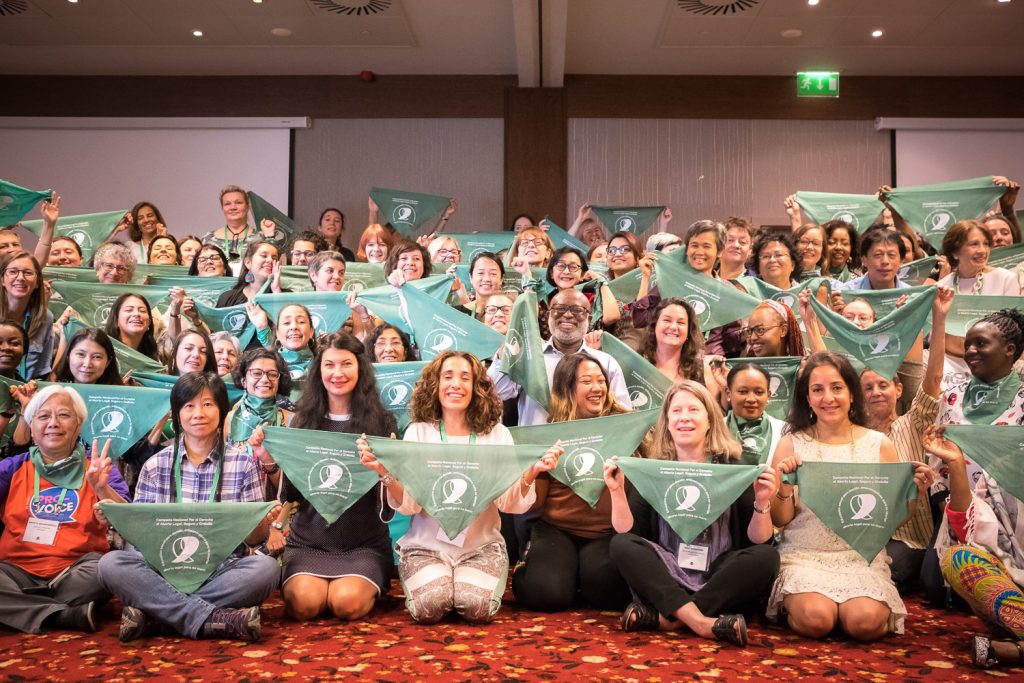
Future priorities & recommendations by Forum participants
On the last afternoon of the Forum, in plenary, we had an open discussion about the future and asked everyone to make recommendations for priorities for their own work, for regional and international work, and also for the Campaign as well. This is the long and inspiring list of recommendations they made and the priority issues they raised:
Work to build the international campaign…
- Promote the International Campaign for Women’s Right to Safe Abortion as an international network by and for its members, and involve members throughout the year, as happens for example with International Safe Abortion Day, 28 September.
- Set up a Youth Action Network within the Campaign, by and for young members, for young women to connect and share and work on their specific issues.
At all levels, campaign and advocate for:
- The right to safe abortion as an essential part of gender equality and full citizenship for women. Pregnancy and motherhood should not be forced on women and girls.
- The understanding that women and girls seek abortion when pregnancy is unwanted. The reasons are personal. It is her life and her body, no one else’s. There are no exceptions.
- Decriminalisation of abortion (legal and social) and eradication of restrictive abortion laws – the only necessary grounds are the right to life and health, reject laws based on other specific grounds, time limits, clinical and other gatekeeping measures. We don’t need 200+ different national laws on abortion or and having to challenge them, country by country, legal ground by legal ground.
- Abortion is health care.
- Choice of abortion method – where possible provide both medical and surgical methods that are recommended by WHO. Stop the use of out-dated methods, especially D&C.
- Promotion of self-management and very early use of abortion pills – based on the safety of the method and women’s autonomy. Use the language of “abortion with pills”, promote a health systems approach for increased access, e.g. via telemedicine, trained pharmacy workers, and at primary/community health care level.
- National approval of both mifepristone and misoprostol for abortion and other obstetric & gynaecological uses.
- Access to second trimester abortions, which are crucial for a minority of women. Most abortions are before 10-12 weeks. Almost all abortions take place by 20 weeks of pregnancy but a small minority need abortions later than that. These must be available, not criminalised.
- Seek to include the right to abortion in national constitutions as one aspect of women’s equality as citizens and rights holders.
- The absolute right to abortion when pregnancy arises from rape and sexual abuse, with special attention to girl children and those in armed conflicts, crisis, refugee, displacement, and other humanitarian settings.
- A national and global moratorium on prosecution of those who have abortions and those who provide safe abortion.
- Elimination of forced abortion policies targeting disabled, HIV-positive, ethnic/religious and other minorities.
- Recognition of the safety of self-management of abortion with pills, but also that complications and deaths may occur, even though rare. Hence, help and services must be available as and when needed.
- Public health systems to take responsibility to provide universal access to abortion care for everyone who needs it.
- Attention to the specific needs of girls and adolescents, who often end up with the most unsafe abortions.
Key priorities and activities should be to…
- Inform women about safe abortion and their rights, and where to find services. Support for women through their abortions.
- Build a critical mass of support for the right to safe abortion, especially among girls and women, as a major priority for effective campaigning for change. Build national consensus on moving forward.
- Ensure the inclusion of young women’s and girls’ voices – not for discussion only amongst young people but mainstreamed in international agendas. Accept youth as equal stakeholders.
- Build coalitions within the abortion rights movement and alliances with others, e.g. human rights defenders, gender and sexual rights movements, violence against women groups, disabled women’s rights movements, and supporters of contraceptive and emergency contraceptive use.
- Document women’s and girls’ abortion experiences and stories, including both good experiences and those that illustrate the human cost of criminalised, illegal and unsafe abortion.
- Support young women’s work on abortion, sexual rights, and the sexual and reproductive health needs of young people, especially in conservative environments.
- Explore what is meant by decriminalisation vs. legalisation of abortion and how best to protect the rights of women and girls as well as service providers.
- Discuss and share information on effective forms of campaigning, e.g. a single issue or intersectional approach as appropriate in each setting.
- Recognise and counter the diversity of anti-abortion views – those based on culture and tradition, conservative religion, efforts to tie women and girls to motherhood, opposition to autonomy, disregard of women’s lives, and due to low fertility rates – and address any false or misleading information and challenge the language and images involved.
- Promote nationally funded abortion services, ensuring that everyone who needs them has access to services, especially those who are least able to pay
- Use the WHO Strategic Approach, working with members of government and policy makers, the medical profession, the health system, women’s movements and supportive NGOs to analyse the national picture and develop key stakeholder involvement to promote national change.
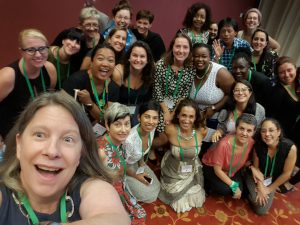
Closing remarks…
Melisa Upreti (UN Working Group on the issue of discrimination against women in law and in practice) expressed her profound respect and affection for the people in the room. She observed that the Forum and its topics have led to reflections on achievements and strategies among the participants, revealing a powerful dynamic of introspection and intellectual fluidity which is important for abortion activists. Activists fight for power, influence and rights, and control over our own bodies and lives, which is a difficult fight because it is against a globally entrenched system of centuries-old patriarchy. Laws, policies and practices are critical, but they may not be enough. A transformative vision must be sharpened by local and national opportunities, of which the Forum in Lisbon is a good example. The Forum has built on our collective knowledge, experience, solidarity and passion. It is key to laying the foundation for future activism and the process of securing abortion rights. It is important also to recognise and celebrate the gains in the abortion movement and sustain efforts, while bracing ourselves for what lies ahead. Let’s march onward so that we may fully realise our own strength and claim our rightful place in this world.
Thanks!!!!
The Campaign Coordination Team would like to express our gratitude to the David and Lucile Packard Foundation, particularly to Lana Dakan, for the generous grant and expression of support that it represents. The grant made it possible not only to hold the Forum but also to conduct a ten-hour discussion workshop over three days at the Abortion & Reproductive Justice Conference, Rhodes University in Makhanda, South Africa, 8-12 July 2018 and offer funding in January 2019 to some of the Forum participants to organise seven national and one regional coalition-building meeting for promoting safe abortion.
We also want to thank the Safe Abortion Action Fund, Taconic Fund, International Women’s Health Coalition (IWHC), Asia-Pacific Resource and Research Centre for Women, Ipas Africa Alliance, Global Fund for Women, Catholics for Choice, Center for Reproductive Rights, and Ibis Reproductive Health for supporting the attendance of several Lisbon Forum participants. Finally, we want to thank all the speakers, moderators, planning committee members and advisors as well as our colleagues in Portugal Sociedade Portuguesa da Contracepção and Associação para o Planeamento da Família (APF) for practical advice and support.
Lastly, our thanks to the Planning Committee who worked with us to develop the agenda and choose participants: Mariana Romero, Beverly Winikoff, Kinga Jelinska, Selma Hajri, Rodica Comendant, and Beatriz Galli. And to the several dozen other people who came to brainstorming meetings pre-2018, put us in touch with valuable contacts and encouraged us when we thought it might never happen.
Social evening and the wonderful fado singer…
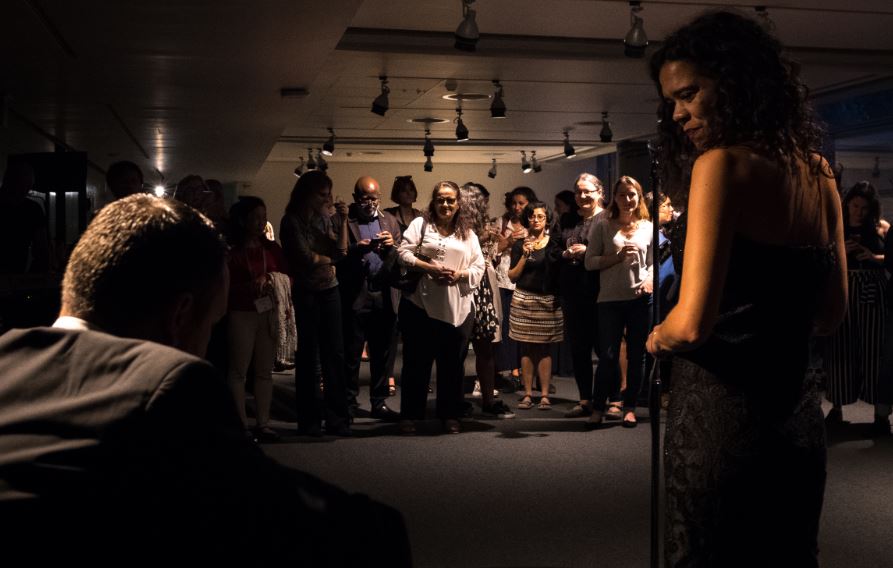
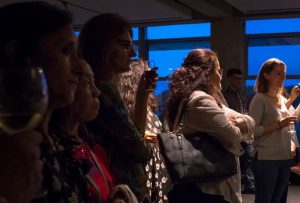

Read the full report here



